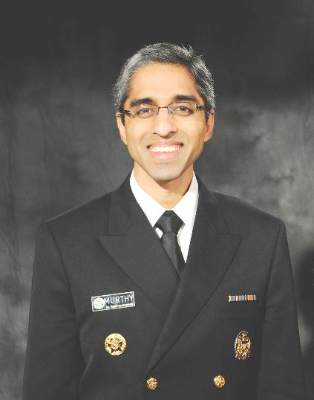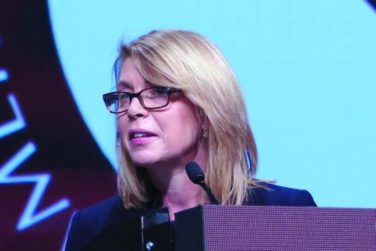AT HOSPITAL MEDICINE 2016
SAN DIEGO (FRONTLINE MEDICAL NEWS) – When Dr. Vivek H. Murthy was a medical student, he had no idea what a hospitalist was. He figured he’d spend his medical career providing outpatient care.
Dr. Murthy, whose appointment as U.S. surgeon general was approved in December of 2014, credits “some wonderful mentors at Brigham and Women’s Hospital where I trained, who helped me see that the hospitalist career could be a fulfilling one,” he told attendees gathered at the annual meeting of the Society of Hospital Medicine. “Initially, when I became a hospitalist, I thought it would be a temporary thing, something I did for a couple of years while I figured out what I really wanted to do in life. As it turns out I really loved what I did as a hospitalist. I loved teaching. I loved caring for patients. I loved being part of a tight-knit team [of] fellow hospitalists.”
One of the things he missed most as surgeon general, he continued, was “those moments sitting by a patient’s bedside and also those moments weekend rounding – not because I like working weekends, but because the camaraderie that you have with the other hospitalists who are there over the weekend can be fantastic.”
In reflecting on some of his experiences in the past year, including a visit to Flint, Mich., to meet with officials and families in the wake of the crisis over lead in that city’s water, Dr. Murthy encouraged conference attendees to consider the following question: When it comes to health, how can we do better by our fellow Americans?
“Many of the conversations I had in Flint and around the country convinced me that if we want to safeguard the health of our nation, if we want people to live up to their full potential, if we want them to bound back during times of adversity, we have to think about how to create a foundation for health that serves everyone in America,” Dr. Murthy said. “This is important because health is more than a set of lab values, more than a set of illnesses that hurt. Health is the key to opportunity. An essential element of the promise of America is that opportunity should be available to all who are willing to work for it. Put another way, health is intrinsically connected to the American Dream. If we safeguard the health of our people, we bring opportunity and the American Dream closer and closer within their grasp.”
The foundation of a healthy life “requires us to create a culture of prevention in America, a culture that is grounded in good nutrition, physical activity, and emotional well-being,” Dr. Murthy said. “I also believe an effective foundation for health must be inclusive and equitable, bringing the benefits of prevention and treatment to all people, regardless of where they live or the color of their skin. I believe that hospitalists can and must be leaders in helping the nation build this foundation for health.”
One challenge to building a solid foundation for health, he continued, is creating a culture that equates “healthy” with happiness. “Right now, choosing health options is too often associated with pain, not with pleasure,” he said. “Think about how many people look at their gym routine as an onerous burden, something that they have to do to prevent a heart attack in 20, 30, or 40 years. It’s not very inspiring. In fact, many people have told me that the way they figure out what to eat at a restaurant is to [avoid menu items listed as ‘healthy’], figuring it won’t taste so good. We have a ways to go in rebranding health.”
Dr. Murthy is the cofounder of VISIONS, an HIV/AIDS education program in India and the United States, which he led for 8 years.






